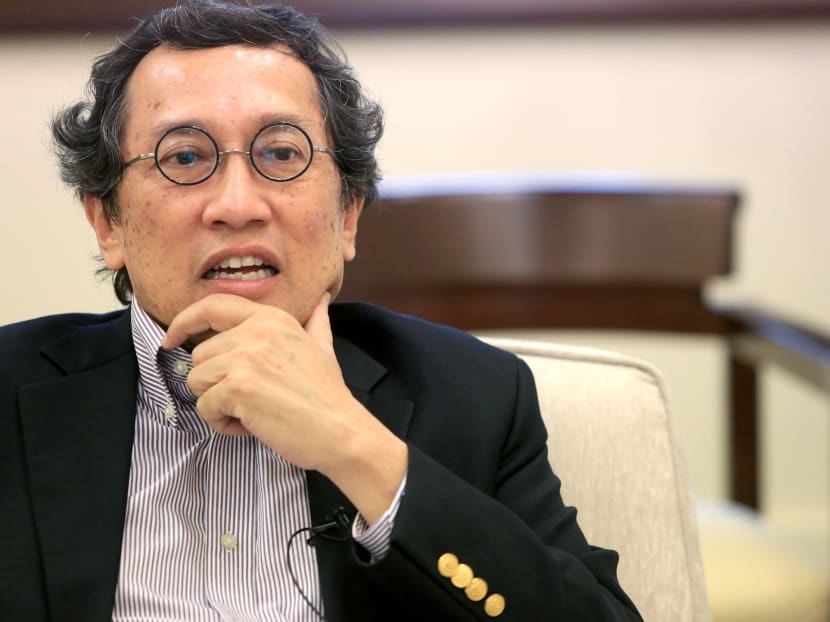China’s actions lent themselves to misunderstanding: Bilahari
SINGAPORE — Responding to Chinese Vice-Foreign Minister Liu Zhenmin’s accusation that two of Singapore’s senior envoys had misunderstood Beijing’s intentions in the South China Sea, Singapore’s Ambassador-at-Large Bilahari Kausikan said yesterday that China’s own actions “were of a nature that lent itself to misunderstanding”.

Mr Bilahari Kausikan, Ambassador-at-Large, Singapore, taken on March 3, 2016. Photo: Koh Mui Fong/TODAY
SINGAPORE — Responding to Chinese Vice-Foreign Minister Liu Zhenmin’s accusation that two of Singapore’s senior envoys had misunderstood Beijing’s intentions in the South China Sea, Singapore’s Ambassador-at-Large Bilahari Kausikan said yesterday that China’s own actions “were of a nature that lent itself to misunderstanding”.
“If we have misunderstood, it can only be because what China did was of a nature that lent itself to misunderstanding. He (Mr Liu) or anyone else is welcome to clarify China’s actions and try to convince me of the error of my ways,” said Mr Kausikan when contacted by TODAY yesterday evening.
“But the misunderstanding seems to be general and not confined to just one or two persons,” noted Mr Kausikan.
Mr Kausikan and former Association of South-east Asian Nations (ASEAN) secretary-general and Singapore’s Ambassador-at-Large Ong Keng Yong had said, during a conference in Jakarta on Monday, that China was splitting ASEAN by reaching a consensus with three ASEAN states on the South China Sea issue.
The two senior diplomats’ remarks came after Chinese Foreign Minister Wang Yi announced a four-point consensus with Brunei, Laos and Cambodia on the South China Sea issue last Saturday. Among the points agreed upon was that territorial disputes in the sea were “not an issue between China and ASEAN as a whole”.
Mr Kausikan had reportedly said during the conference that the consensus can be seen as a means to divide the regional grouping ahead of an international ruling on a case against China brought by the Philippines over the South China Sea, while Mr Ong criticised the move as tantamount to China “meddling” in ASEAN’s internal affairs.
Mr Liu told reporters yesterday that he was “quite shocked” by the comments from the two envoys and he immediately sought clarification from Singapore. “Here I like to share what they said: ‘That the comments are made by former Singaporean diplomats, and it is completely their individual comments and they do not represent the position of the Singapore government’,” the vice-minister said after attending the 11th ASEAN-China Senior Officials’ Meeting on the Implementation of the Declaration on the Conduct of Parties in the South China Sea (DOC) and the 22nd ASEAN-China Senior Officials’ Consultations, which ended yesterday afternoon.
Singapore is hosting the meeting for the first time as the ASEAN-China country coordinator.
“Of course, I believe the comments made by the two former Singaporean diplomats are based on miscalculations and misunderstanding of China-ASEAN relations,” Mr Liu added.
Mr Liu, who co-chaired the consultations with Ministry of Foreign Affairs’ Permanent Secretary Chee Wee Kiong, also said yesterday that China had proposed a joint declaration for ASEAN states to be signed during the ASEAN-China foreign ministers meeting in July.
The joint declaration is meant to reaffirm the elements in the DOC, even while discussions on a more binding Code of Conduct (COC) are ongoing.
China has overlapping claims with the ASEAN nations of Brunei, the Philippines, Malaysia and Vietnam in the South China Sea, as well as Taiwan. Recent efforts by Beijing to create artificial islands with military facilities have sparked alarm in the region.
Mr Liu said the ongoing case against China, brought by the Philippines to the Permanent Court of Arbitration, is a violation of the DOC. He claimed yesterday that the DOC is legally binding, according to Beijing’s interpretation. He said the DOC — which China signed with ASEAN in 2002 — states that all signatories are to resolve disputes through dialogues and diplomatic means.
Mr Liu also refuted suggestions that China was responsible for delaying the implementation of the DOC.
“China didn’t delay the process, the fault is with some ASEAN members, due to some technical issues,” he said without elaborating.
Meanwhile, Mr Chee said the meeting had enjoyed some progress, including the adoption of a 24-hour hotline for maritime emergencies, where senior officials will be the focal point.
“We hope to continue the positive momentum of negotiations and make steady progress towards a substantive COC based on consensus, as directed by our foreign ministers and leaders,” he said. ADDITIONAL REPORTING BY ALBERT WAI






